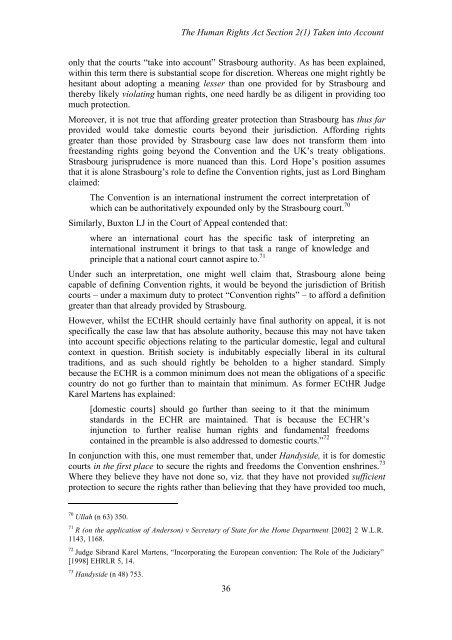Open UKLSR Volume 1(2) - Uklsa
Open UKLSR Volume 1(2) - Uklsa
Open UKLSR Volume 1(2) - Uklsa
You also want an ePaper? Increase the reach of your titles
YUMPU automatically turns print PDFs into web optimized ePapers that Google loves.
The Human Rights Act Section 2(1) Taken into Account<br />
only that the courts “take into account” Strasbourg authority. As has been explained,<br />
within this term there is substantial scope for discretion. Whereas one might rightly be<br />
hesitant about adopting a meaning lesser than one provided for by Strasbourg and<br />
thereby likely violating human rights, one need hardly be as diligent in providing too<br />
much protection.<br />
Moreover, it is not true that affording greater protection than Strasbourg has thus far<br />
provided would take domestic courts beyond their jurisdiction. Affording rights<br />
greater than those provided by Strasbourg case law does not transform them into<br />
freestanding rights going beyond the Convention and the UK’s treaty obligations.<br />
Strasbourg jurisprudence is more nuanced than this. Lord Hope’s position assumes<br />
that it is alone Strasbourg’s role to define the Convention rights, just as Lord Bingham<br />
claimed:<br />
The Convention is an international instrument the correct interpretation of<br />
which can be authoritatively expounded only by the Strasbourg court. 70<br />
Similarly, Buxton LJ in the Court of Appeal contended that:<br />
where an international court has the specific task of interpreting an<br />
international instrument it brings to that task a range of knowledge and<br />
principle that a national court cannot aspire to. 71<br />
Under such an interpretation, one might well claim that, Strasbourg alone being<br />
capable of defining Convention rights, it would be beyond the jurisdiction of British<br />
courts – under a maximum duty to protect “Convention rights” – to afford a definition<br />
greater than that already provided by Strasbourg.<br />
However, whilst the ECtHR should certainly have final authority on appeal, it is not<br />
specifically the case law that has absolute authority, because this may not have taken<br />
into account specific objections relating to the particular domestic, legal and cultural<br />
context in question. British society is indubitably especially liberal in its cultural<br />
traditions, and as such should rightly be beholden to a higher standard. Simply<br />
because the ECHR is a common minimum does not mean the obligations of a specific<br />
country do not go further than to maintain that minimum. As former ECtHR Judge<br />
Karel Martens has explained:<br />
[domestic courts] should go further than seeing to it that the minimum<br />
standards in the ECHR are maintained. That is because the ECHR’s<br />
injunction to further realise human rights and fundamental freedoms<br />
contained in the preamble is also addressed to domestic courts.” 72<br />
In conjunction with this, one must remember that, under Handyside, it is for domestic<br />
courts in the first place to secure the rights and freedoms the Convention enshrines. 73<br />
Where they believe they have not done so, viz. that they have not provided sufficient<br />
protection to secure the rights rather than believing that they have provided too much,<br />
70 Ullah (n 63) 350.<br />
71 R (on the application of Anderson) v Secretary of State for the Home Department [2002] 2 W.L.R.<br />
1143, 1168.<br />
72 Judge Sibrand Karel Martens, “Incorporating the European convention: The Role of the Judiciary”<br />
[1998] EHRLR 5, 14.<br />
73 Handyside (n 48) 753.<br />
36


